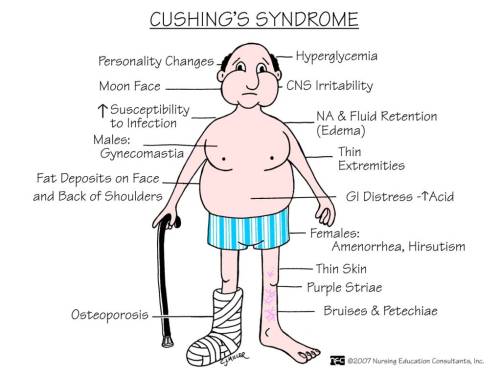Are you carrying adrenal Cushing’s syndrome without knowing it?
Genetic research that will be published tomorrow in the New England Journal of Medicine suggests to Dr. Andre Lacroix, professor at the University of Montreal, that clinicians’ understanding and treatment of a form of Cushing’s syndrome affecting both adrenal glands will be fundamentally changed, and that moreover, it might be appropriate to begin screening for the genetic mutations that cause this form of the disease. “Screening family members of bilateral adrenal Cushing’s syndrome patients with genetic mutations may identify affected silent carriers,” Lacroix said in an editorial in this Journal. “The development of drugs that interrupt the defective genetic chemical link that causes the syndrome could, if confirmed to be effective in people, provide individualized specific therapies for hypercortisolism, eliminate the current practice of removing both adrenal glands, and possibly prevent disease progression in genetically affected family members.” Adrenal glands sit above the kidneys are mainly responsible for releasing cortisol, a stress hormone. Hypercortiolism means a high level of the adrenal hormone cortisol, which causes many symptoms including weight gain, high blood pressure, diabetes, osteoporosis, concentration deficit and increased cardiovascular deaths.
Cushing’s syndrome can be caused by corticosteroid use (such as for asthma or arthritis), a tumor on the adrenal glands, or a pituitary gland that releases too much ACTH. The pituitary gland sits under the brain and releases various hormones that regulate our bodies’ mechanisms.
Jérôme Bertherat is a researcher at Cochin Hospital in Paris. In the study he published today, he showed that 55% of Cushing’s Syndrome patients with bilaterally very enlarged adrenal glands have mutations in a gene that predisposes to the development of adrenal tumours. This means that bilateral adrenal Cushing’s is much more hereditary than previously thought. The new knowledge will also enable clinicians to undertake genetic screening. Hervé Lefebvre is a researcher at the University Hospital in Rouen, France. His research shows that the adrenal glands from the same type of patients with two large adrenal glands can produce ACTH, which is normally produced by the pituitary gland. Hormone receptors are the chemical link that cause a cell to behave differently when a hormone is present.
Several misplaced hormone receptors cause the ACTH to be produced in the enlarged benign adrenal tissue. Knowing this means that researchers might be able to develop drugs that interrupt the receptors for these hormones and possibly even prevent the benign tissue from developing in the first place.
###
Note
The University of Montreal is officially known as Université de Montréal.
About Professor André Lacroix, M.D.
 Professor André Lacroix., M.D., is with a professor at the Department of Medicine at Université de Montréal’s Faculty of Medicine and the Centre Hospitalier de l’Université de Montréal Research Centre, where he is head of the Endocrine Pathophysiology Laboratory.
Professor André Lacroix., M.D., is with a professor at the Department of Medicine at Université de Montréal’s Faculty of Medicine and the Centre Hospitalier de l’Université de Montréal Research Centre, where he is head of the Endocrine Pathophysiology Laboratory.
Further information
André Lacroix, M.D., Heredity and Cortisol Regulation in Bilateral Macronodular Adrenal Hyperplasia, New England Journal of Medicine 369;22, November 28, 2013
Estelle Louiset, Ph.D., Céline Duparc, Ph.D., Jacques Young, M.D., Ph.D., Sylvie Renouf, Ph.D., Milène Tetsi Nomigni, M.Sc., Isabelle Boutelet, Ph.D., Rossella Libé, M.D., Zakariae Bram, M.Sc., Lionel Groussin, M.D., Ph.D., Philippe Caron, M.D., Antoine Tabarin, M.D., Ph.D., Fabienne Grunenberger, M.D., Sophie Christin-Maitre, M.D., Ph.D., Xavier Bertagna, M.D., Ph.D., Jean-Marc Kuhn, M.D., Youssef Anouar, Ph.D., Jérôme Bertherat, M.D., Ph.D., and Hervé Lefebvre, M.D., Ph.D., Intraadrenal Corticotropin in Bilateral Macronodular Adrenal Hyperplasia, New England Journal of Medicine 369;22, November 28, 2013
Guillaume Assié, M.D., Ph.D., Rossella Libé, M.D., Stéphanie Espiard, M.D., Marthe Rizk-Rabin, Ph.D., Anne Guimier, M.D., Windy Luscap, M.Sc., Olivia Barreau, M.D., Lucile Lefèvre, M.Sc., Mathilde Sibony, M.D., Laurence Guignat, M.D., Stéphanie Rodriguez, M.Sc., Karine Perlemoine, B.S., Fernande René-Corail, B.S., Franck Letourneur, Ph.D., Bilal Trabulsi, M.D., Alix Poussier, M.D., Nathalie Chabbert-Buffet, M.D., Ph.D., Françoise Borson-Chazot, M.D., Ph.D., Lionel Groussin, M.D., Ph.D., Xavier Bertagna, M.D., Constantine A. Stratakis, M.D., Ph.D., Bruno Ragazzon, Ph.D., and Jérôme Bertherat, M.D., Ph.D., ARMC5 Mutations in Macronodular Adrenal Hyperplasia with Cushing’s Syndrome, New England Journal of Medicine 369;22, November 28, 2013
###
William Raillant-Clark
.(JavaScript must be enabled to view this email address)
514-343-7593
University of Montreal